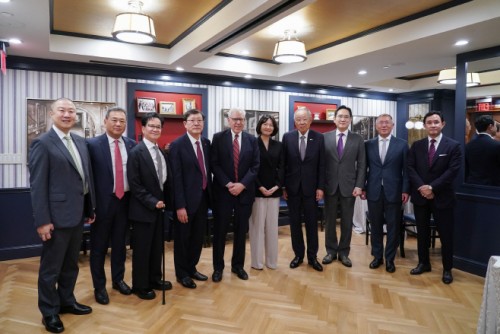 |
| Ryu Jin, chairman of the Federation of Korean Industries (fourth from left), poses with Carlyle Group Chairman David Rubenstein and other business leaders before the U.S.-Korea Business Roundtable in Washington, D.C., on August 25. From left: LS Chairman Koo Ja-eun, Lotte Vice Chairman Kim Sang-hyun, CJ Chairman Lee Jay-hyun, GS Chairman Huh Tae-soo, Rubenstein, Naver CEO Choi Soo-yeon, Ryu, Samsung Electronics Chairman Lee Jae-yong, Hyundai Motor Chairman Chung Eui-sun, and Korea Zinc Chairman Choi Yoon-beom. / Source: FKI |
Business leaders from South Korea and the United States gathered in Washington, D.C., on August 25 to chart a new era of industrial cooperation, pledging to transform the recent tariff deal into concrete investments worth $150 billion.
The “KORUS Business Roundtable: Partnership for a Manufacturing Renaissance,” hosted by the Federation of Korean Industries (FKI), brought together more than 40 top executives and officials. The event coincided with President Lee Jae-myung’s first state visit to the United States.
The U.S. side featured Nvidia CEO Jensen Huang, Carlyle Group co-founder David Rubenstein, Applied Materials CEO Gary Dickerson, Danaher CEO Rainer Blair, and senior executives from Google, IBM, Boeing, Lockheed Martin, OpenAI, GE, GM, and others.
FKI Chairman Ryu stressed Korea’s commitment: “Korean companies plan $150 billion in U.S. investments to open a new era of manufacturing renaissance. From AI, semiconductors, and biotech to shipbuilding, nuclear power, and supply chains, Korea and the U.S. can together create a golden age for industry.”
The roundtable focused on three main areas: advanced industries (semiconductors, AI, biotech), strategic sectors (shipbuilding, nuclear energy, defense), and supply chain technologies (mobility, batteries, materials). Participants also discussed harnessing AI to modernize manufacturing, tackling energy challenges, and exploring new defense and space partnerships.
Particular emphasis was placed on shipbuilding, an industry the U.S. is eager to revive. With South Korea recognized as the world’s strongest shipbuilding nation, officials highlighted the synergy of aligning U.S. policy goals with Korea’s expertise. The tariff deal already earmarked part of the $150 billion investment for this sector.
Beyond industry-specific projects, discussions also touched on energy transition initiatives such as Korea’s “energy highway” plan, critical mineral sourcing, and creating a more favorable bilateral business environment.
Most Read
-
1
-
2
-
3
-
4
-
5
-
6
-
7





















